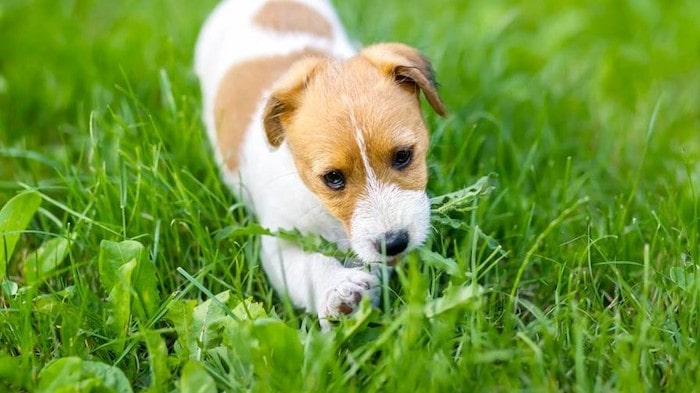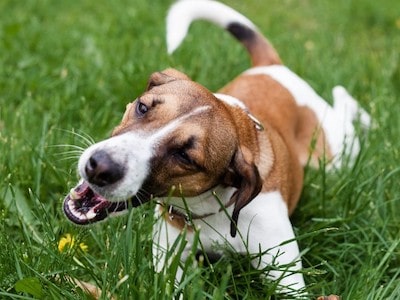As dog owners, we’ve all witnessed our furry friends nibbling on the green blades from time to time, leaving us puzzled and curious about the underlying reasons behind this peculiar habit.
In this article, we’ll delve into the possible explanations behind why dogs engage in this grass-grazing behavior, shed light on its potential implications for their health, and ultimately gain a deeper understanding of our beloved four-legged companions.
So, let’s dig into the mystery and find out what drives our canine pals to seek out that verdant treat!
Contents [hide]
Reasons Why Dogs Eat Grass
There are many speculations and theories as to why dogs eat grass, but there is limited research on the exact reason. So the truth is … that no one knows for sure. However, scientists have formed a few hypotheses and disproved some myths based on the research we do have. Here are some of the possible reasons why dogs eat grass:
- To ease nausea or feelings of sickness: Some dogs may eat grass to induce vomiting when they have an upset stomach or have eaten something toxic.
However, this is not very common, as only about 10% of dogs show signs of illness before eating grass, and only about 25% of dogs vomit after eating grass.
This means that most dogs that eat grass are not sick or trying to make themselves sick. In fact, eating grass may actually help them feel better by soothing their throat or stomach.

- To ease the pain and discomfort of bloating or excessive stomach gas: Some dogs may eat grass to relieve pressure in their abdomen caused by gas buildup or overeating. Eating grass may help them pass gas or stool more easily.
This may be more common in dogs that have a sensitive digestive system or eat foods that cause gas, such as beans, dairy products, or cruciferous vegetables.
If your dog is bloated or gassy, you may notice them panting, drooling, whining, or stretching their abdomen.
- To fulfill some unmet nutritional need, including the need for fiber: Some dogs may eat grass to supplement their diet with vitamins, minerals, or fiber that they are lacking. This may be due to poor quality food, insufficient intake, or digestive disorders.
One study found that a dog that ate grass and vomited every day for seven years stopped doing so after switching to a high-fiber diet. This was evidence that this particular dog was supplementing his dietary deficiency by eating grass and plants.
Once provided with adequate fiber in his diet, the grass-eating behavior resolved. However, this does not mean that all dogs that eat grass have a nutritional deficiency.
Grass mainly passes through the dog’s intestinal tract undigested, so it does not provide much nutritional value. Dogs are primarily carnivores, meaning they eat meat, but they have evolved the ability to digest some carbohydrates in response to coevolving with humans. However, they still cannot digest grass very well.
- As a form of pica, or eating strange nonfood items, sometimes caused by a diet deficiency: Some dogs may eat grass as a compulsive behavior that stems from boredom, stress, anxiety, or frustration. This may be more common in puppies and younger dogs that have more energy and curiosity.
Pica can also be caused by anemia or other medical conditions that affect appetite or taste. Pica can be dangerous for dogs if they ingest items that are toxic, sharp, or indigestible, such as plastic, metal, or bones.
If your dog has pica, you may notice them chewing or swallowing things that are not food.
- Out of boredom: Some dogs may eat grass simply because they have nothing else to do or they are looking for some stimulation. This may be more likely if your dog is left alone for long periods of time or does not get enough exercise or mental enrichment.
Dogs are social and intelligent animals that need physical and mental activity to keep them happy and healthy. If they are bored, they may resort to eating grass or other behaviors that are fun for them but annoying for us, such as digging, barking, or chewing.
- As a tasty treat: Some dogs may eat grass because they enjoy the taste or texture of it. They may also be attracted by the smell or appearance of certain plants or flowers.
This may be more common in dogs that have been exposed to grass since they were young or have learned to associate it with positive experiences.
For example, some dogs may eat grass after playing fetch with their owner on the lawn, or after getting a treat from their owner in the garden.
Potential Risks of Eating Grass
While eating grass may not be harmful for most dogs in moderation, there are some potential risks that you should be aware of. One of them is the possibility of ingesting parasites, pesticides, or toxins from the grass or other plants.
Some plants may contain substances that are toxic for dogs, such as sago palm, azalea, lily of the valley, oleander, etc. If your dog eats these plants, they may experience symptoms such as vomiting, diarrhea, seizures, liver failure, or even death.
Therefore, it’s important to know what plants are in your yard or in the areas where you walk your dog and avoid them if possible.

Another risk is that your dog may ingest parasites from the soil or feces of other animals that may be present on the grass. Some common parasites that can affect dogs are roundworms, hookworms, whipworms, tapeworms, giardia, and coccidia.
These parasites can cause symptoms such as weight loss, diarrhea, vomiting, anemia, or even organ damage. Therefore, it’s important to keep your dog up to date on their deworming and fecal tests and consult your veterinarian if you notice any signs of infection.
A third risk is that your dog may ingest pesticides or herbicides that may have been applied to the grass or other plants. These chemicals can be harmful for dogs if they are ingested in large amounts or over a long period of time.
They can cause symptoms such as drooling, vomiting, diarrhea, tremors, seizures, or even death. Therefore, it’s important to avoid letting your dog eat grass from areas that have been treated with these chemicals or wash their mouth and paws after exposure.
How to Prevent or Reduce Grass Eating
If you want to prevent or reduce your dog’s grass eating behavior, there are some steps you can take. Here are some tips:
- Provide your dog with enough exercise and mental stimulation. Engage them in some fun activities such as playing fetch, tug-of-war, hide-and-seek, or agility. Provide them with some interactive toys or puzzles that challenge their brain and keep them occupied.
- Feed your dog a balanced and high-quality diet that meets their nutritional needs. Consult your veterinarian about the best type and amount of food for your dog based on their age, size, breed, and health condition. Avoid feeding your dog table scraps or human foods that may upset their stomach or cause nutritional imbalances.

- Check your dog’s health regularly and visit your veterinarian at least once a year for a wellness exam. Your veterinarian can perform blood tests, urine tests, fecal tests, and physical exams to detect any underlying health issues that may cause your dog to eat grass or other nonfood items. Your veterinarian can also prescribe medications or supplements that may help with your dog’s digestion or nutrition.
- Avoid letting your dog eat grass from areas that may be contaminated with parasites, pesticides, or toxins. If you can’t prevent your dog from eating grass entirely, at least choose areas that are clean and safe for them. Wash your dog’s mouth and paws after they eat grass to remove any residues that may be harmful for them.
FAQs
Is it normal for dogs to eat grass?
Yes, it’s relatively common for dogs to eat grass. Studies suggest that around 80% of dogs have engaged in this behavior at some point in their lives. While it might be perplexing to us, it’s generally considered normal for our canine companions.
Will eating grass harm my dog?
In most cases, eating small amounts of grass is unlikely to cause harm to your dog. However, if you notice excessive grass consumption, vomiting, or any signs of distress, it’s essential to consult your veterinarian to rule out any underlying health issues.
Should I stop my dog from eating grass?
If your dog occasionally grazes on grass and doesn’t show any signs of distress, there’s typically no need to intervene. However, if you’re concerned about their grass-eating habits, it’s advisable to consult your veterinarian for guidance.
Can puppies eat grass too?
Puppies may also be curious about grass and may engage in grass-eating behavior. However, as with adult dogs, it’s crucial to monitor their habits and ensure they don’t ingest anything harmful.
Well, That’s a Wrap
Dogs eating grass is a common and usually harmless behavior that may have various reasons behind it.
Some dogs may eat grass to ease their nausea, improve their digestion, fulfill their nutritional needs, follow their instincts, relieve their boredom, or enjoy the taste.
However, there are some potential risks of eating grass such as parasites, pesticides, or toxins that may harm your dog’s health.
To prevent or reduce your dog’s grass eating behavior, you should provide them with enough exercise and mental stimulation, feed them a balanced and high-quality diet, check their health regularly and visit your veterinarian as needed, and avoid letting them eat grass from areas that may be contaminated with harmful substances.

A retired veterinary technician and full-time dog parent. James knows to serve the community with the best of his knowledge of animal healthcare. He has been working in a known veterinary clinic for quite a few years. He loves reading blogs on pet nutrition and writes unbiased reviews of dog products.


